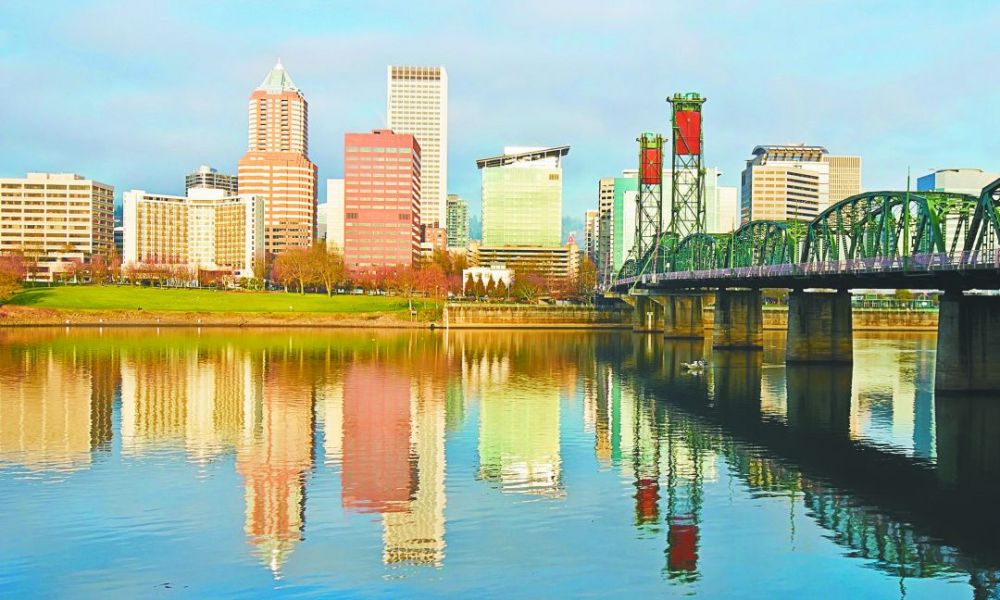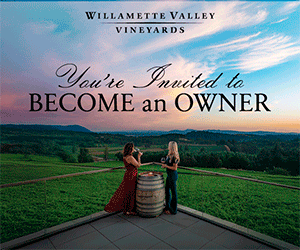Rose City Uncorked
Stroll down memory lane transports writer to ’90s Portland
During the 1990s, this writer had the good fortune to pen a weekly wine column in This Week Magazine, then the Portland area’s largest publication. With a weekly circulation of 510,000, it enjoyed a near-saturation reach of Portland tri-county area households.
This Week provided readers with interesting perspectives on a wide range of subjects, from local issues to lifestyle, finance to food. My weekly column, “Wine for the Money,” featured recommendations of value-priced wines based on blind tasting evaluation. Each week a different type or category of wines was selected and reviewed.
Owing to This Week’s dominant coverage, it reached the point where readers were snatching up recommended wines so quickly many retailers ran out. As a result, I became immersed in the Portland wine scene, which was building on a solid base of aficionados and a growing public interest in local wines.
During the ’90s, the Oregon industry experienced tremendous growth. Annual production nearly tripled, from 7,000 to 18,600 tons. Portland’s wine awakening began in the mid-1970s, when trade show display company owner Bert Harris became so enamored with wine, he underwent a complete lifestyle change to accommodate his new passion.
Harris opened a wine shop, Harris Wine Cellars, in Northwest Portland and brought in fine French and California wines from Bay Area importers. He began offering wine appreciation classes and established the Oregon chapter of the San Francisco-based Academy of Wine Tasters.
In those days, Portland’s only retailer stocking a serious wine selection was Strohecker’s, a gourmet grocer catering primarily to up-market customers residing in the West Hills — broadly defined, that includes all Southwest and Northwest neighborhoods that embrace the heights immediately to the west of downtown.
Now retired, Wayne Strohecker had been a wine buff since he was young. Given the financial means to acquire a substantial inventory of top imported and domestic wines, he amassed a cellar collection never before seen locally. The finest French wines along with some of the best from Italy, Germany, Spain and Portugal lined his shelves, as well as a constantly expanding representation of California’s ever more impressive North Coast appellations.
In the late 1980s, Strohecker hired an eager young man named Bob Liner as his wine department manager. Business boomed during Liner’s tenure. Having added considerably to his knowledge, not to mention operational experience, Liner joined forces with Matt Elsen, another young wine professional, in the early 1990s to open Liner & Elsen Wine Merchants in Northwest Portland.
Liner & Elsen’s reputation rapidly rose as wine-interested Portlanders flocked to their shop on N.W. 21st Street. There, customers found an amazing selection of some of the finest wines from around the world, including Oregon’s best. They also catered to collectors and other deep-pocket customers who pre-ordered Bordeaux classified growths and grand cru Burgundies and bought private cellar wines.
Also serving high-end Portland-area buyers was, and still is, Karen Hinsdale’s Cellar Door. She and then-husband Howard Hinsdale bought out John Henny in 1972 and built Henny-Hinsdale into Oregon’s first statewide, fine wine distributor.
Henny-Hinsdale was sold to Columbia Distributors in 1994, but Karen wanted to remain firmly in the business. With close contacts in Europe and a core of customers who respected her selections, The Cellar Door has operated ever since as a speciality fine wine merchant.
Portland’s restaurant scene explosion was just getting underway; along with it, a greater emphasis on wine and its pairing with entrées. During the ’90s, these Northwest neighborhood restaurants included The Heathman, Paley’s Place and Wildwood, plus a smattering of other new fine dining establishments led by Bruce Carey’s Zefiro in the rapidly emerging Pearl District.
Down the street from The Heathman was Oregon Wines on Broadway, the first Oregon retailer to devote its efforts exclusively to the state’s producers. The fact that it is still around attests to the fact that they must have done something right.
Opened in 1978, Martinotti’s on S.W. 10th Avenue was presided over by Armand Martinotti, a quirky character who loved wine and, at will, was capable of supplying information on every bottle in the place. And he proved to be as much a hoarder as a seller. When he passed on, his family couldn’t believe all the older vintages stashed around the premises. Martinotti’s is still run by family members who emphasize Italian food and wine.
East of the Willamette River, Great Wine Buys on N.E. Broadway was the domain of the inimitably eclectic Rachel Starr, an intellectually astute, diploma-bearing Ph.D. who stocked only what she liked and could personally recommend. Starr’s palate was so attuned to Oregon Pinots, she ultimately started her own winery. Rachel has since passed away, but her legacy continues in the wine shop she founded.
The Fujino family opened Woodstock Wine & Deli on S.E. Woodstock Street back in 1985. They started out selling imported salamis and cheeses and making delectable sandwiches for on-the-spot consumption. While other family members focused on food, son Gregg built an incredible selection of wines with a particular emphasis on Oregon. His imports were impressive, too, and his policy was to allow customers to drink wine they just purchased with food without a corkage fee.
A couple others with the same moniker — spelled slightly differently — made their marks on the local wine scene in the 1990s. Greg Lemma, owner of Lemma Wine Company, one of the area’s largest wholesale distributors since 1973, boasted an impressive list of Italian imports as well as other European and California wines. His offerings accounted for a considerable percentage of the wine department at S.E. Hawthorne Street’s Italian deli, Pastaworks, which carried the largest selection of Italian wines in the state.
Another contributor to the Pastaworks shelves was Greg Zancanella, who founded Admiralty Beverage and sought out interesting wines to import from the home of his ancestors. Like several others, he ultimately sold his business to Columbia Distributors, whose owners, the Maletis family, are Oregon’s uncontested barons of beer and wine. However, Zancanella re-emerged with his own business in 2000, specializing in, what else? Exceptional, hard-to-find Italian wine.
Lest we forgot, the world’s largest winery, Gallo, already had a major presence on the local scene going way back. Hearty Burgundy and its brethren were put into the marketplace through Gallo’s own distributor, Valley Wines of Beaverton. Not surprisingly, Valley’s winery list went well beyond the Modesto-based big boys.
Today, more than two dozen Portland retailers could qualify as card-carrying wine merchants, if such a formal designation existed. Several wine bars augment the options — there’s even one that pours only sparkling.
There may have been more than one winery actually in the city limits of Portland back then, but the only one I recall is Adams in Northwest Portland. Today, of course, as explored in October’s cover story, the city’s wine production scene is growing rapidly.
As for wholesale distributors, the base has shrunk considerably to a couple major players dominating retail shelves these days. But a few specialty operations have emerged in recent years to spice up the selections.



 Karl Klooster is the associate editor of the Oregon Wine Press and writes a wine column for the
Karl Klooster is the associate editor of the Oregon Wine Press and writes a wine column for the 







